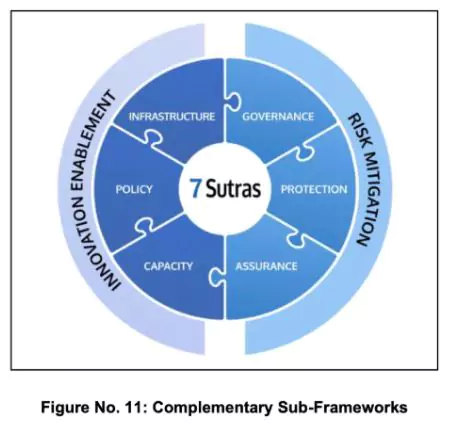The RBI’s Framework for Responsible and Ethical Enablement of Artificial Intelligence (FREE-AI) committee, set up in December 2024, has proposed 26 recommendations under six pillars to promote ethical AI use in finance.
About the FREE-AI Committee
- Constituted by: Reserve Bank of India (RBI).
- Chairperson: Dr. Pushpak Bhattacharyya.
- Mandate: Study the present level of AI adoption in financial services and review regulatory and supervisory approaches on AI with a focus on the financial sector globally.
- Purpose: Develop a framework for responsible and ethical AI use in the financial sector.
- Focus: Ensure consumer protection while enabling AI adoption.
- Terms of Reference:
- Assess AI adoption in financial services in India and globally.
- Review global regulatory and supervisory approaches to AI in finance.
- Identify AI-related risks and recommend frameworks for evaluation, mitigation, and monitoring, including compliance for banks, NBFCs, FinTechs, and PSOs.
- Recommend a governance framework for ethical AI adoption in India’s financial sector.
- Address any other AI-related matters in the financial sector.
Benefits and Opportunities of AI in Financial Services
- Operational & Business Advantages:
- Enhances efficiency, accuracy, and personalisation at scale.
- For Example AI analytics for customer behaviour and risk management.
- Financial Inclusion:
- Assess creditworthiness using non-traditional data (utility bills, mobile usage, GST filings).
- Voice-enabled banking in regional languages for illiterate/semi-literate users.
- Chatbots for financial literacy, grievance redressal, and behavioural nudges.
The Seven Sutras – Guiding Principles
The Committee has formulated 7 Sutras – a set of foundational principles that will guide the development, deployment, and governance of AI in the financial sector.
- Trust is the Foundation: Trust is non-negotiable and should remain uncompromised
- People First: AI should augment human decision-making but defer to human judgment and citizen interest
- Innovation over Restraint: Foster responsible innovation with purpose
- Fairness and Equity: AI outcomes should be fair and non-discriminatory
- Accountability: Accountability rests with the entities deploying AI
- Understandable by Design: Ensure explainability for trust
- Safety, Resilience, and Sustainability: AI systems should be secure, resilient and energy efficient
FREE-AI Framework

The FREE-AI Framework translates the 7 sutras into actionable recommendations through two complementary sub-frameworks
1. Innovation Enablement Framework
- Focus: Unlock AI’s transformative potential while ensuring responsible adoption.
- Pillars:
-
- Infrastructure – Build data ecosystems, compute capacity, and public goods to support AI development.
- Policy – Create adaptive, agile regulatory frameworks to encourage innovation.
- Capacity – Strengthen human skills and institutional ability to manage AI responsibly.
2. Risk Mitigation Framework
- Focus: Address risks from AI integration in finance.
- Pillars:
-
- Governance – Establish clear structures for oversight of AI decisions and actions.
- Protection – Safeguard consumers and systems from harm.
- Assurance – Ensure ongoing validation, monitoring, and control of AI systems.
Key Recommendations
- Data Infrastructure: Establish a high-quality financial sector data infrastructure as digital public infrastructure, integrated with AI Kosh – India Datasets Platform under the IndiaAI Mission.
About Sandbox
In cybersecurity, a sandbox is an isolated environment that allows suspicious files, programs, or applications to be run and analyzed without endangering the main system or network. |
- Sandbox: Set up an AI Innovation Sandbox to test AI solutions in a controlled environment.
- Indigenous AI Models: Develop financial sector-specific AI models to reduce dependence on foreign technologies.
- Adaptive AI Policy: Formulate enabling AI policies that evolve with technological advancements.
- AI Liability Framework: Introduce clear accountability rules for AI-related outcomes.
- Executive and Regulatory Training: Build AI-related capacity for boards, C-suite executives, regulators, and supervisors.
- Institutional Capacity Building: Conduct training and strengthen regulatory oversight and technical competence.
- Risk-Based AI Audits: Implement a board-approved AI audit framework based on AI risk categorisation.
- Lifecycle Audit Coverage: Ensure audits assess data inputs, algorithms, and decision outputs.
- Cybersecurity and Consumer Protection: Enhance safeguards for AI-powered financial services.
![]() 14 Aug 2025
14 Aug 2025


